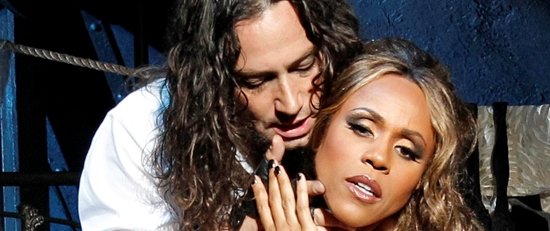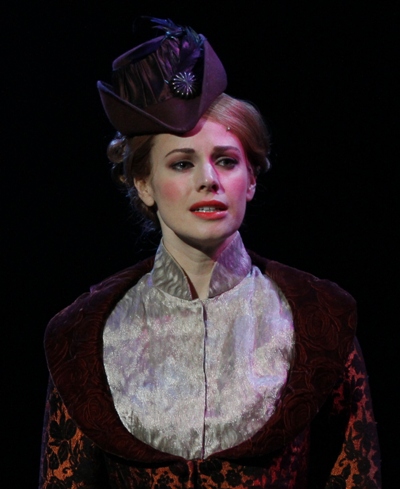B’way-bound ‘Jekyll & Hyde’ shows star stuff, but it’s numbed by jolts of ennui
 Review: “Jekyll & Hyde,” a revival of the Frank Wildhorn musical bound for Broadway, at the Cadillac Palace Theatre presented by Broadway in Chicago through March 24. ★★
Review: “Jekyll & Hyde,” a revival of the Frank Wildhorn musical bound for Broadway, at the Cadillac Palace Theatre presented by Broadway in Chicago through March 24. ★★
By Nancy Malitz
There is singing with star power at the raunchy center of “Jekyll & Hyde,” the Frank Wildhorn 1997 musical, which has been revived with amped up energy and a harder rock edge compared to the show that played for nearly four years on Broadway.
But time’s running out for the fix-it guys, who have significant tweaking to do if Deborah Cox’s splendid Lucy, the tart with a heart, and Constantine Maroulis’s sexy Mr. Hyde — Dr. Jekyll’s dangerous alter ego — are to have the success that’s within reach.
 The re-tooled show is playing its last pre-Broadway tour stop at Chicago’s Cadillac Palace before going on to Broadway’s Marquis Theatre in April for a widely anticipated revival. And despite nifty high-voltage stagecraft and campy thriller effects that drip with self parody, this show barely survives its dreary first third (Jekyll’s betrothal and professional frustrations) or its last third (a wedding crisis no one cares about).
The re-tooled show is playing its last pre-Broadway tour stop at Chicago’s Cadillac Palace before going on to Broadway’s Marquis Theatre in April for a widely anticipated revival. And despite nifty high-voltage stagecraft and campy thriller effects that drip with self parody, this show barely survives its dreary first third (Jekyll’s betrothal and professional frustrations) or its last third (a wedding crisis no one cares about).
American Idol finalist and “Rock of Ages” star Constantine Maroulis is not yet comfortable in the skin of the earnest Dr. Jekyll, whose struggles to win support for his path-breaking scientific work dominate the opening sequences. His selfless mission to isolate the evil in men must win us over if we’re to care what happens to him next.
Perhaps Maroulis is experimenting. But his twitchy characterization of the good scientist is too nerdy at the outset to win our sympathy. Hidden under eyeglasses and a bowler hat, we barely ever see his face. He covers his voice, which sounds strangled rather than soft, too muffled for all the “I need,” “I love” and “I am” lyricism that lies in store. Dr. Jekyll has won Emma’s hand in promise of marriage. It shouldn’t be left to us to wonder why.
 But the show takes an exciting turn when Jekyll, on his last night of bachelorhood, gets all tied up in a brothel aptly called The Spider’s Web. There Deborah Cox, as the harlot Lucy, spins the first real vocal magic of the night, singing “Bring on the Men” like a queen of spiders from atop the center of a web of ropes that she and the other lusty girls use to encoil their clients.
But the show takes an exciting turn when Jekyll, on his last night of bachelorhood, gets all tied up in a brothel aptly called The Spider’s Web. There Deborah Cox, as the harlot Lucy, spins the first real vocal magic of the night, singing “Bring on the Men” like a queen of spiders from atop the center of a web of ropes that she and the other lusty girls use to encoil their clients.
The number’s a knockout, and Cox is hypnotic, a virtuoso of vocal expression with instant audience rapport. By the end of the brothel number, you know nearly everything you need to know about Lucy — her spunk, her heart, her fierce legitimacy. She’s a beautiful dominatrix, tough without, yet as we soon learn, also tender within.
Jekyll’s spellbound. So are we. And the show, at last, gets its groove on.
 Maroulis’s turn comes next, a winning trifecta of songs beginning with “This is the Moment,” during which Jekyll determines to use himself as the subject of experiments designed to release the evil that lurks within.
Maroulis’s turn comes next, a winning trifecta of songs beginning with “This is the Moment,” during which Jekyll determines to use himself as the subject of experiments designed to release the evil that lurks within.
The number has become an all-purpose pop standard of self-empowerment, and it takes Maroulis’s voice into its high-energy comfort zone, clarion at the top, impressively assured as he notches it ever higher. Next come “Transformation” and “Alive!” as the sinister Mr. Hyde appears, then escapes into his elegant, evil ballet of murder and mayhem, with Maroulis in fine cape-swirling form. The whole sequence seems belligerently superhuman and it’s bound to drive crowds wild; let’s hope it’s not too hard on this star’s vocal cords in the long run.
As for Cox’s Lucy, she brings out the best in Maroulis’ Jekyll as well as his Hyde. The good doctor’s heartfelt attempts to protect her from his more sinister self lead to Lucy’s admission of impossible “Sympathy, Tenderness,” a lovely ballad, most delicately, achingly sung. And in their interactions as unlikely friends, we glimpse some nobility at last in Jekyll, whose blindness to danger comes convincingly across as compassion-driven.
 In their more dangerous game together, as Lucy and Hyde, Cox and Maroulis fairly sizzle. But her murder brings an end to the show’s essential heat, and without her it’s a long cool ride downhill to the end. Whether Jekyll will jilt his fiancée at the altar is something the audience has a hard time caring about — the scene plays like a grandmother’s handkerchief thrust into the middle of a rock concert.
In their more dangerous game together, as Lucy and Hyde, Cox and Maroulis fairly sizzle. But her murder brings an end to the show’s essential heat, and without her it’s a long cool ride downhill to the end. Whether Jekyll will jilt his fiancée at the altar is something the audience has a hard time caring about — the scene plays like a grandmother’s handkerchief thrust into the middle of a rock concert.
And although there is fine precedence in grand opera for the tragic hero to linger long before expiring, with a couple of stratospheric high notes along the way, we’re in unfortunate comic book territory when one’s impulse is to ask “Will you not die, sir?” as Jekyll struggles with his lengthy sword, thrusting it deeper and deeper between treacly suicidal stanzas, to scattered nervous giggling in the audience.
 A company of very strong singers rounds out this production, although Teal Wicks is in an almost impossible position to win sympathy for Jekyll’s bride-to-be Emma. The character’s a virginal ingenue type, yet Wicks seems to sense that the production has taken on an edge that might eclipse her, and thus adds modern mannerisms and embellishing belts to almost every line. Who can blame her? She’s caught in the show’s essential difficulty of finding a way to make Jekyll’s life interesting, when Hyde himself is so much more fun.
A company of very strong singers rounds out this production, although Teal Wicks is in an almost impossible position to win sympathy for Jekyll’s bride-to-be Emma. The character’s a virginal ingenue type, yet Wicks seems to sense that the production has taken on an edge that might eclipse her, and thus adds modern mannerisms and embellishing belts to almost every line. Who can blame her? She’s caught in the show’s essential difficulty of finding a way to make Jekyll’s life interesting, when Hyde himself is so much more fun.
Tobin Ost’s swirling scenic slabs, Daniel Brodie’s shape-shift projections and Jeff Croiter’s eery lighting magic inject plenty of life into this show. There’s punk bravado and high wit in Jekyll’s laboratory, where six-foot test-tubes filled with bubbling liquor turn flourescent green, then red, at the touch of a finger. The rig that Jekyll has assembled to inject himself with potion is a sly one, evoking memories of Poe’s torture chambers and Frankenstein’s monster in shackles.
 And I like the way Ost’s set pieces function almost as an additional character in the story, tilting Caligari-like to echo Jekyll’s increasing madness. Early on, the slabs become full-length portraits that hover above five of Jekyll’s most persistent Victorian nay-sayers (below); then later, as Hyde begins to murder regularly, the same slabs resemble open coffins. Nice, the way Jekyll and Hyde look out for each other.
And I like the way Ost’s set pieces function almost as an additional character in the story, tilting Caligari-like to echo Jekyll’s increasing madness. Early on, the slabs become full-length portraits that hover above five of Jekyll’s most persistent Victorian nay-sayers (below); then later, as Hyde begins to murder regularly, the same slabs resemble open coffins. Nice, the way Jekyll and Hyde look out for each other.
One doesn’t know what to make of the show’s fractured sound at the Cadillac. Surely a production team this sophisticated technically will avoid, on Broadway at least, the damage of an over-bearing sound set-up that disintegrates into harshness at the top and makes it difficult to hear the words through the general level of din. Whether the Chicago problem’s a tour issue or a theater issue, it doesn’t do the cast any favors.
Related Link:
- Performance location, dates and times: Go to TheatreinChicago.com
- Find other touring shows coming to Chicago: Go to BroadwayinChicago.com
- Constantine Maroulis works out (vocally) with Seth Rudetsky: Go to YouTube.com
- Teal Wicks on playing Jekyll’s betrothed: Read it at ChicagoOntheAisle.com
- Deborah Cox sings Lucy’s wistful “New Life”: Go to youTube.com
Captions and credits: Home page and top: Mr. Hyde (Constantine Maroulis) is a threatening lover to Lucy (Deborah Cox). Constantine Maroulis as Dr. Jekyll. Lucy (Deborah Cox) and fellow prostitutes weave their spells on clients. Constantine Maroulis as Mr. Hyde.The last time Mr. Hyde (Constantine Maroulis) visits Lucy (Deborah Cox) there’s murder on his mind. Dr. Jekyll’s campy lab has giant test tubes that glow flourescent colors. Emma (Teal Wicks) is betrothed to Jekyll, but the wedding’s in serious doubt. Below: The company of Victorian nay-sayers who ridicule Dr. Jekyll. (Photos by Chris Bennion)
Tags: "Jekyll & Hyde", Bring on the Men, Broadway in Chicago, Cadillac Palace Theatre, Constantine Maroulis, Daniel Brodie, Deborah Cox, Frank Wildhorn, Jeff Croiter, Teal Wicks, This is the Moment, Tobin Ost












